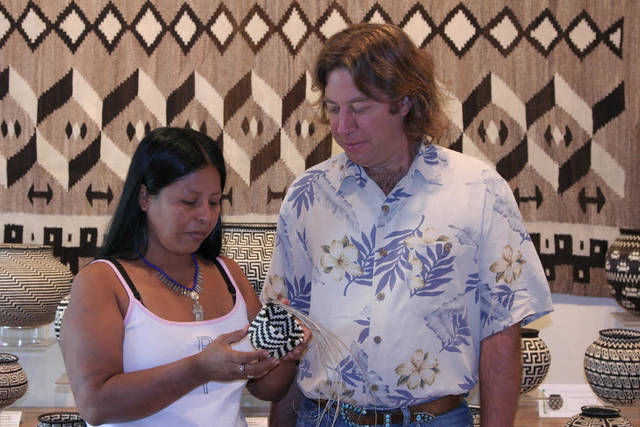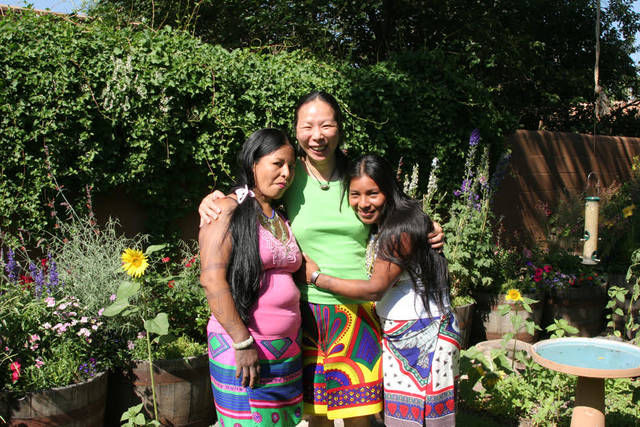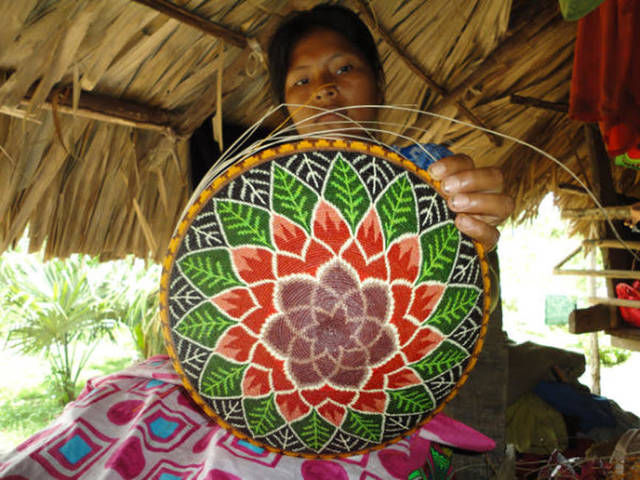PRINCEVILLE — Deep in the rainforests of Panama, indigenous tribes are weaving baskets in order to keep up with the modernization of the world. Some of them take months, even years, to make — starting with the harvesting of chunga
PRINCEVILLE — Deep in the rainforests of Panama, indigenous tribes are weaving baskets in order to keep up with the modernization of the world.
Some of them take months, even years, to make — starting with the harvesting of chunga palm leaves, which are made into thread, then dyed with mud or plant pigments.
A collection of the handwoven Wounaan rainforest baskets will be on sale at Princeville Community Center on Sunday and July 23.
“These are beautiful pieces of art, and the people that sew them live simply in the rainforest with creative minds,” said Laiyee Smith, co-owner of Michael Smith Gallery.
Michael and Laiyee Smith owned galleries in Santa Fe, New Mexico, specializing in Native American art and antiques before moving to Kauai three years ago. They began selling the baskets in 2005.
They left much of their collection of antiques and art in New Mexico, but brought the baskets with them because the designs and story fit in well with Hawaiian culture.
“They have rainforest designs with things like jaguars, turtles, butterflies and frogs — things that seem to fit in really well here,” Michael Smith said.
The baskets also feature flowers, like orchids, and cultural designs, like patterns of diamonds, spirals and bands.
And while the baskets sell anywhere from $30 to over $5,000, it’s not just the money that motivates the couple to sell the art.
Their goal is to empower indigenous people, particularly in the rainforests, and enable them to stay on their land and make a life for themselves in today’s material-based world.
“I did get to spend some time with them and get to know them, and helping them is our mission,” Laiyee Smith said. “When you see these people, you can’t help but love them and help them.”
Wounaan basket weaving began in the 1980s when the tribal people were introduced to things like clothing, coffee, pots and pans and other items from the modern world.
“They needed money to buy those things,” Michael Smith said. “They made simple baskets for their own use, so they evolved their craft to a trade.”
The original baskets were used to store foods and goods, and were bland compared to the brightly colored and intricately designed baskets of today.
The introduction of sewing needles, instead of the traditional method of finger weaving, allowed the artisans to explore fine weaving.
“The women, you can tell they put their heart and soul in it,” Laiyee Smith said.
Selling the baskets is just part of how the Smiths are helping the Wounaan people. They also donate part of their proceeds to nonprofit organizations that focus on indigenous people in the rainforest, including the 501(c)3, Native Future.
“They’re struggling with land rights issues — people are cutting down the rainforest,” Michael Smith said.
Over the past 12 years, the Smiths have donated more than $70,000 to the cause.
“If we get enough money with these two sales, we can help fund their projects,” Michael Smith said. “It’s great that our investment continues to have a purpose. I want to feel like my life mattered.”
Wounaan rainforest baskets are becoming increasingly scarce because many people have stopped weaving and are moving on to other jobs.
“This is a group of people that had never done this before. They taught themselves to do it and now it’s coming to a close because it just doesn’t make sense economically anymore,” Michael Smith said. “I’ve never seen anything finer woven.”
The Wounaan rainforest basket show and sale is set for Sunday and July 23 at the Princeville Community Center, from 11 a.m. to 6 p.m. each day.




